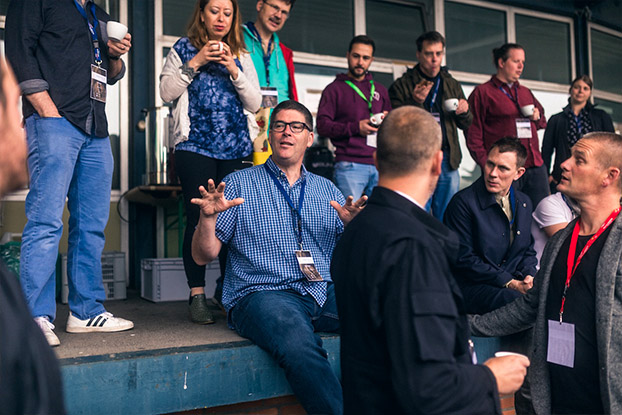
“Tonight is about the big picture, big questions, big ideas — audacious ideas,” Assistant Professor Wesley Longhofer said as he welcomed students to the third annual Audacious Ideas Night, part of his Business and Society course for Goizueta undergraduate students.
During the semester, students worked in teams to brainstorm and finalize their big ideas, then presented to their classmates in an “audacious ideas knockout round” prior to the event. The eight teams that earned the most votes from their peers presented at the final event.
“The purpose of Audacious Ideas Night is for students to turn a problem on its head and offer a creative, business-oriented solution,” Longhofer said. “And our students never cease to amaze me. Their ideas this year urge us to rethink how we organize entire transportation, food and justice systems. And, in thinking audaciously, they actually generate some pretty actionable solutions.”
A panel of judges were tasked with selecting two winning teams: most actionable and most audacious. Judges included Goizueta Dean Erika James; Brian Goebel, managing director of Social Enterprise at Goizueta; Rhonda Fischer 13MBA, chief operating officer at the East Lake Foundation; Alex Clementi, project and program coordinator at the Center for Civic Innovation; and Davion Ziere 14BBA, founder and CEO at Culturebase.
A third winning team received the popular choice award by earning the most investment “dollars” from the student teams in attendance.
2018 Audacious Ideas
Secure the future (Winner: Most Audacious): The problem? According to this team, funding public education with property taxes is not working. Differing levels of affluence leads to disparities in school funding.
The audacious idea: Cut the U.S. defense budget by half and reallocate the funds to education. The budget increase for education would lead to better and more equitable teacher pay, higher quality school lunches, enhanced teacher development programs and other benefits for teachers and students nationwide.
Go a mile and give a mile (Winner: Most Actionable): The problem? Many Americans have no savings, and the average round trip airfare is more than $300. Additionally, frequent flyer miles often go unused or expire.
The audacious idea: Implement a program to donate expired frequent flyer miles to students who cannot afford to travel home during breaks or for emergencies. The team asserted that being able to visit home over school breaks would have a positive effect on mental health and academic performance of the students.
Banning bail (Winner: People’s Choice Award): The problem? Some inmates spend years in jail awaiting a trial. Additionally, the team shared research that people of color were more likely to be denied bail and to have a higher bond.
The audacious idea: Eliminate bail in Georgia. The team referenced other states that reduced dependency on cash bail systems, including California, which eliminated cash bail entirely. “Are you going to help us eliminate bail, or are you going to continue down the road of inequality?” the team asked the audience.
Paving the way to plastic roads: The problem? Anyone who has driven around Atlanta recognizes the ubiquitous metal plates covering potholes; on other roads, potholes are not addressed at all. Potholes and metal plates can make driving uncomfortable, and potentially dangerous.
The audacious idea: Use recycled residential plastic waste to replace the oil-based components in asphalt used to fill potholes. Asphalt made with recycled plastic is cheaper and more environmentally friendly.
Universal basic income: The problem? Many Americans live paycheck to paycheck, and work in fields that don’t reflect their true passions.
The audacious idea: Challenge the idea that having a job is a necessity and instate a universal basic income. The team quoted economist and social theorist Jeremy Rifkin, who said, “Basic income is not a utopia, it’s a practical business plan for the next step of the human journey.”
The water crisis in the United States: The problem? Lack of access to clean water is not just a problem in the developing world. The team cited the water crisis in Flint, Michigan, and a recent boil water advisory in parts of Atlanta.
The audacious idea: Democratize the clean water supply in the U.S. The team proposed multiple solutions to this complex problem, including redrawing territories and using blockchain technology to make a grid of the public water supply available on the internet.
Erasing food waste: The problem? Universities have programs to address food waste in dining halls, but nothing in place to address food waste at the individual level.
The audacious idea: Use the sharing economy business model to reduce food waste on college campuses. A new app would create a decentralized peer-to-peer market for leftover groceries and food.
Improving the recruiting process for international students: The problem? International students relying on the H-1B visa lottery system deal with enormous uncertainty when searching for jobs: even if offered a position, they may not receive the visa needed to begin work.
The audacious idea: Flip the lottery system for H-1B visas onto corporations instead of individual student applicants. Then, build an online database detailing which companies are sponsoring visas, and for how many positions.










